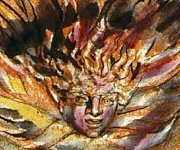Meet composer John Hawkins
When the Piatti Quartet perform at the Old Theatre Royal on 10 December they will be including something rather special – an exciting new two movement quartet by British composer, John Hawkins.
‘Hawkins writes in a sound-language which can be enjoyable and even compelling, ensuring communication at a first hearing.’
MUSIC AND MUSICIANS

John Hawkins
Fuzon is the name of John Hawkin’s seven-minute quartet which was inspired by William Blake (1757 – 1827) who wrote, engraved, painted and printed many extraordinary and prophetic works. In The Book of Ahania Fuzon is the rebellious fourth and final son of Urizen – the embodiment of conventional reason and law. Associated with the classical element of fire, Fuzon fights Urizen for control of the world.

‘A welcome addition to the repertoire’
TEMPO
Fuzon was first performed 2012 at the Royal Academy of Music, London. Click o the image below to hear a vivid performance of Fuzon played by the Piatti Quartet:
Born in 1949, John Hawkins studied composition with Malcolm Williamson and Elisabeth Lutyens. He has written many chamber, vocal and orchestral pieces, which have been performed worldwide, as well as successful music for children.
On the recommendation of conductor Sir Charles Mackerras, Hawkins wrote a large-scale trilogy on the subject of the sea which began with an extraordinary commission from the Marine Society requiring the experience of a four-week voyage to Australia on a container ship!
Hawkins has also written a one-act opera Echoes commisioned and performed as part of Covent Garden’s ‘Garden Venture’ scheme.
Since writing Fuzon, Hawkins has explored the character of Urizen further with a virtuoso piece for viola and piano which has been performed and broadcast many times worldwide. In 2007 it was extended as a version for chamber orchestra for a performance in Japan.
‘A name to remember’
GRAMOPHONE

Hear John Hawkin’s Fuzon played by the prizewinning Piatti Quartet alongside Quartets by Haydn, Bridge, and Schubert on 10 December.

“Musically compelling …” The Strad


